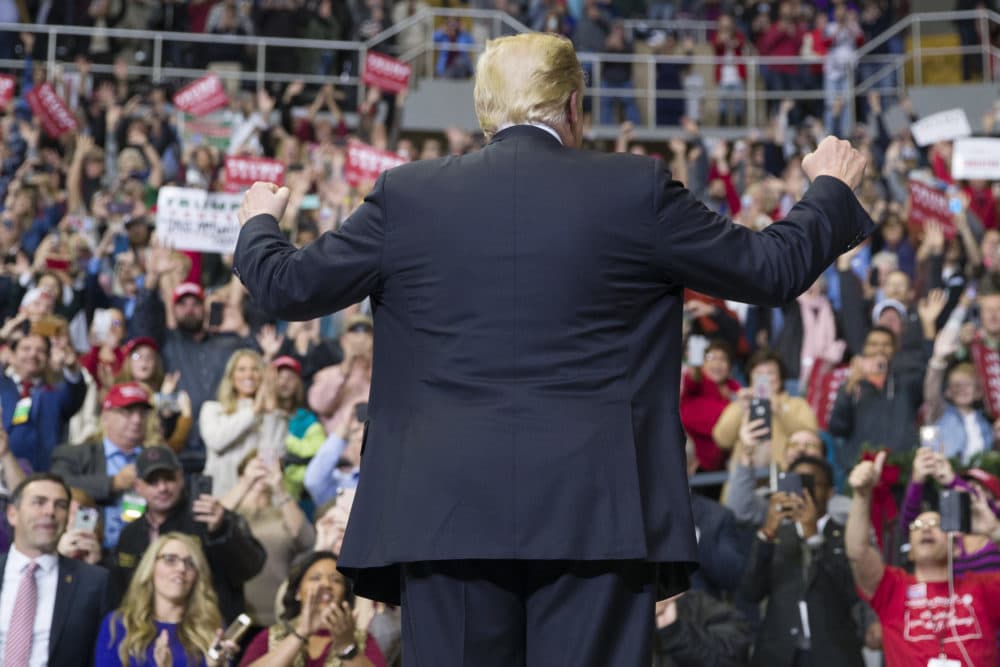Advertisement
Commentary
Racist Americans, Not Trump, Are The Problem. There Might Be A Cure

Listening at social occasions as people burn Donald Trump in verbal effigy, I’ve had an against-the-grain thought. Our president is a racist xenophobe, yes, but he’s only one person (albeit one with his finger on the button), and we all know individuals who are racist or xenophobic (albeit ones who haven’t snatched or tear-gassed children at the border).
The most depressing thing to me is not Trump but the millions who share his fear of those who don’t look like them. We know race is the base of most of these people’s motivation because the supposed proof of Trumpeter tolerance — the 7 to 9 million who backed the Donald in 2016 after having voted for Barack Obama — turns out to be as insubstantial as that border wall.
A new survey of those political switchers joins the shelf-sagging literature attesting to the racist and racially fearful roots anchoring Trump-ian populism. The study found, first, that the Obama-Trump voters (like Trump’s GOP primary voters) were not doing badly economically, scrapping the standard excuse for their 2016 vote. Second, the more racially conservative or anti-immigrant they were, the likelier they were to cast Trump ballots.
The most depressing thing to me is not Trump but the millions who share his fear of those who don’t look like them.
What possessed racially fearful people to vote for the first black president? The answer appears to be a twist on the old racist defense that some of my best friends are black. As one journalist sums up the study, “It’s possible to support Obama in particular while maintaining overall anti-black or anti-immigrant attitudes.”
Indeed, while racial tensions attended Obama’s first victory in 2008, they mushroomed during his presidency. (Some Neanderthals even felt more favorably about the Obamas’ dog when told he belonged to Ted Kennedy.) By 2012, he just eked out the popular vote in his re-election; by 2016, police killings of African Americans, the Black Lives Matter movement, and Trump’s racist, anti-immigrant barking made race even more salient to many voters.
By the 2018 midterms, it was clear that Trump’s base in the white working class isn’t the only fount of prejudice. White voters without a college degree (which generally confers higher income) support the president more than college-educated whites. But almost four in 10 of the latter back him, too. On Election Day, while Democrats won the House, millions of voters either backed white supremacists or their enablers who stand by any candidate with an R after his name.
An avalanche of other evidence proves that the Trump movement runs on racial fumes:
Advertisement
A nationally representative survey of millennials last year found that 41 percent of white ones voted for Trump because they believed whites were losing out to non-whites — and that resentment of the latter drove the perception, even among educated, employed, better-off whites.
Another study found that people whose economic anxiety rose between the start of the Great Recession and the end of Obama’s first term also tended to be racially resentful, with their resentments rather than the economy the biggest kindling on their anxiety.
A survey done almost a year into Trump’s presidency found that when a black man asked Trump supporters’ help with a housing assistance plan, he reaped more anger toward the policy than when a white solicitor approached them. The black man also was more likely to hear Trumpeters blame beneficiaries of the program for their problems. (To be fair, anti-Trump whites reversed the responses, suggesting that liberals’ condescending prejudice toward "Hillbilly Elegy" types is not a complete figment of Trump backers’ minds.)
If you’re still with me, a study published during the 2016 race found that “reminding white Americans high in ethnic identification that non-white racial groups will outnumber whites in the United States by 2042 caused them to become more concerned about the declining status and influence of white Americans as a group ... and caused them to report increased support for Trump and anti-immigrant policies, as well as greater opposition to political correctness."

The good news is that some racists may be curable. Yet more studies found that gay and transgender canvassers who had 10- or 20-minute, empathetic talks with homophobes and anti-trans people often succeeded in defusing their prejudice. Might a similar approach work with racists?
It would require mobilizing what Tocqueville admired as our gift for “association” in churches, schools, activist groups and the like to have one-on-one conversations with prejudiced acquaintances in non-threatening ways. (There’s a model talk and information about these studies here.)
(Separate Yale research appears to corroborate the power of persuasion: It found that conservatives are more fearful for their physical safety than liberals, and that getting the former to imagine they’re safe softens their attitude.)
Check the link about a model talk and you’ll see the author admits that blowback is inevitable from some people who won’t accept talk of racist disparities in policing, criminal justice, health and wealth. In calling on progressives not to hurl the word “racist” at such people, he still found it necessary to talk about “racism” and voters who “shared Trump’s prejudiced views.”
He and I would make lousy canvassers. But journalists’ job is to name the problem — no punches pulled — that canvassers try to cure. When Hillary Clinton called half of Trump’s support “deplorables,” the former secretary of state wasn’t being much of a diplomat. But as an ethicist, she was spot-on.
